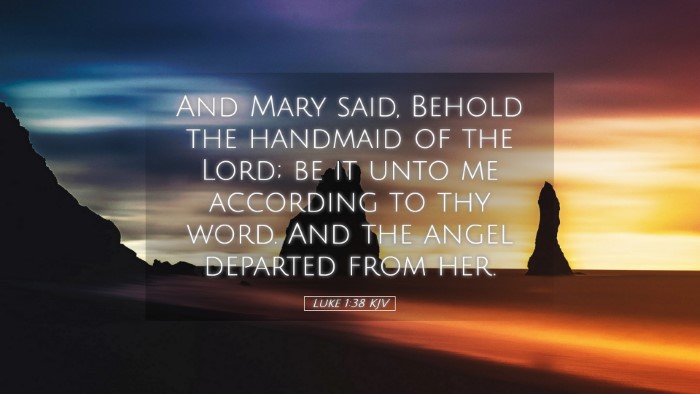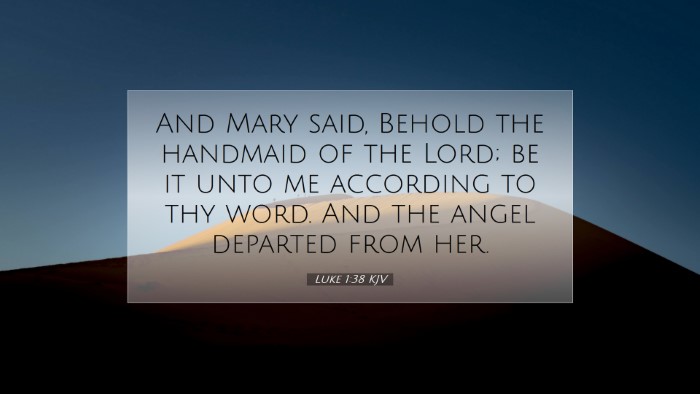Commentary on Luke 1:38
Luke 1:38 states:
"And Mary said, Behold the handmaid of the Lord; be it unto me according to thy word. And the angel departed from her."
Introduction
This verse marks a profound moment in Christian theology—the moment of consent from Mary for the incarnation of Christ. It encapsulates obedience, trust, and submission to God's will. The significance of this passage is pivotal both in the narrative of the Gospel of Luke and in the Christian understanding of God's interaction with humanity.
Historical Context
The setting of this verse involves the angel Gabriel announcing to Mary that she would conceive Jesus, the Son of God. This announcement not only redefined the trajectory of Mary's life but also that of the entire world. Understanding this context is crucial for grasping the depth of Mary's response.
Mary's Response: A Model of Faith
Mary’s declaration, “Behold the handmaid of the Lord,” reflects a heart fully surrendered to the Lord's purpose. It is a statement of identity and role, showcasing her humility and willingness to serve.
Insights from Public Domain Commentaries
Matthew Henry emphasizes the significance of Mary's faith and obedience. He notes that her willingness to accept God's plan demonstrates her exemplary faith. While she faced societal consequences, her reliance on God’s word exemplifies how the faithful are called to respond to divine revelation.
Albert Barnes draws attention to the phrase “Be it unto me according to thy word.” This expresses her deep trust in God’s promise, a willingness to embrace the unknown. His commentary suggests that Mary's faith provides a blueprint for Christian belief, where one must often align individual will with divine will, even when understanding is incomplete.
Adam Clarke adds further depth by analyzing the implications of Mary's acceptance. He underscores that her response sets a precedent for accepting God's will in one's life. Clarke highlights that this moment shows Mary's character—she was not only obedient but was also filled with a profound understanding of the significance of her role in God’s plan for redemption.
Theological Implications
This verse carries rich theological implications not only for Mariology (the study of Mary) but also for the broader Christian understanding of faith and obedience.
- Incarnation: Mary’s consent is critical in the narrative of the Incarnation—where God becomes flesh. Her acceptance highlights the partnership between divine sovereignty and human responsibility.
- Faithfulness: Mary serves as a model of faithfulness and discipleship. Her submission illustrates the call upon all believers to yield their lives to God’s purpose, mirroring Christ’s later submission in the Garden of Gethsemane.
- Women in Scripture: This moment enhances the role of women in salvation history. Mary’s acceptance not only affirms her strength but also sets an empowering example for future generations of women in faith.
Applications for Pastors and Theologians
Pastors and theologians can draw several applications from this passage:
- Teaching Obedience: Mary exemplifies the essence of obedient faith. Sermons can focus on the importance of aligning one's life with the will of God, accepting His plans even when they are beyond personal understanding.
- Encouraging Faith: Mary’s example encourages believers to trust in God’s promises. This narrative can be used to inspire congregations to seek God’s will, reminding them that even in times of uncertainty, faith remains a steadfast anchor.
- Empowerment of Women: Mary’s pivotal role can be emphasized in discussions around women’s leadership and influence within the church, promoting an inclusive theology that acknowledges women's agency in God's work.
Conclusion
In Luke 1:38, Mary’s response encapsulates the essence of faith in action—a faith that trusts God’s word above all circumstances. As scholars, pastors, and students reflect on this verse, they are reminded of the power of yielding to God’s spirit, inspiring lives dedicated to His purposes. Just as Mary embraced her calling, so too are we invited to respond to God's call with the same level of faith and devotion.


